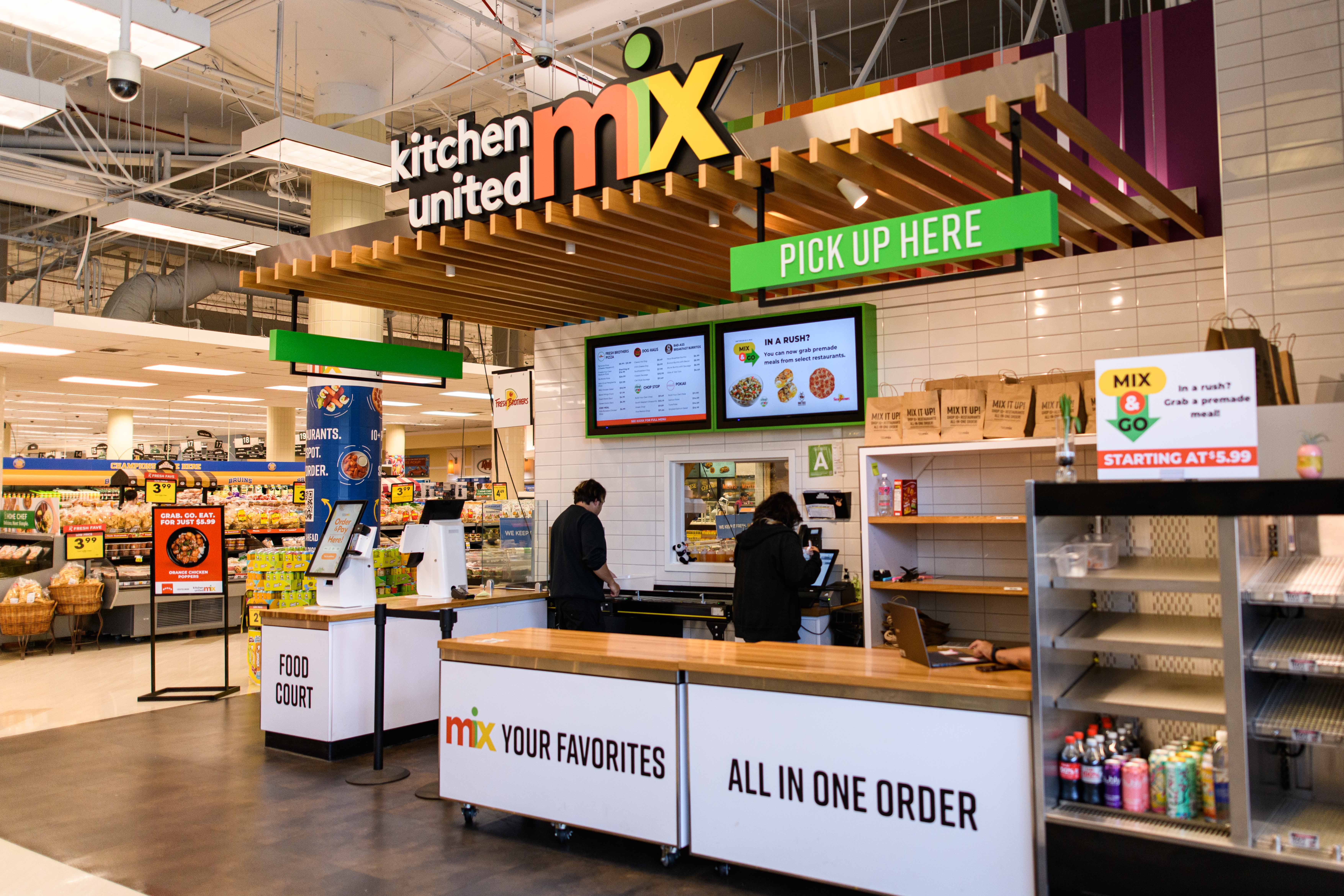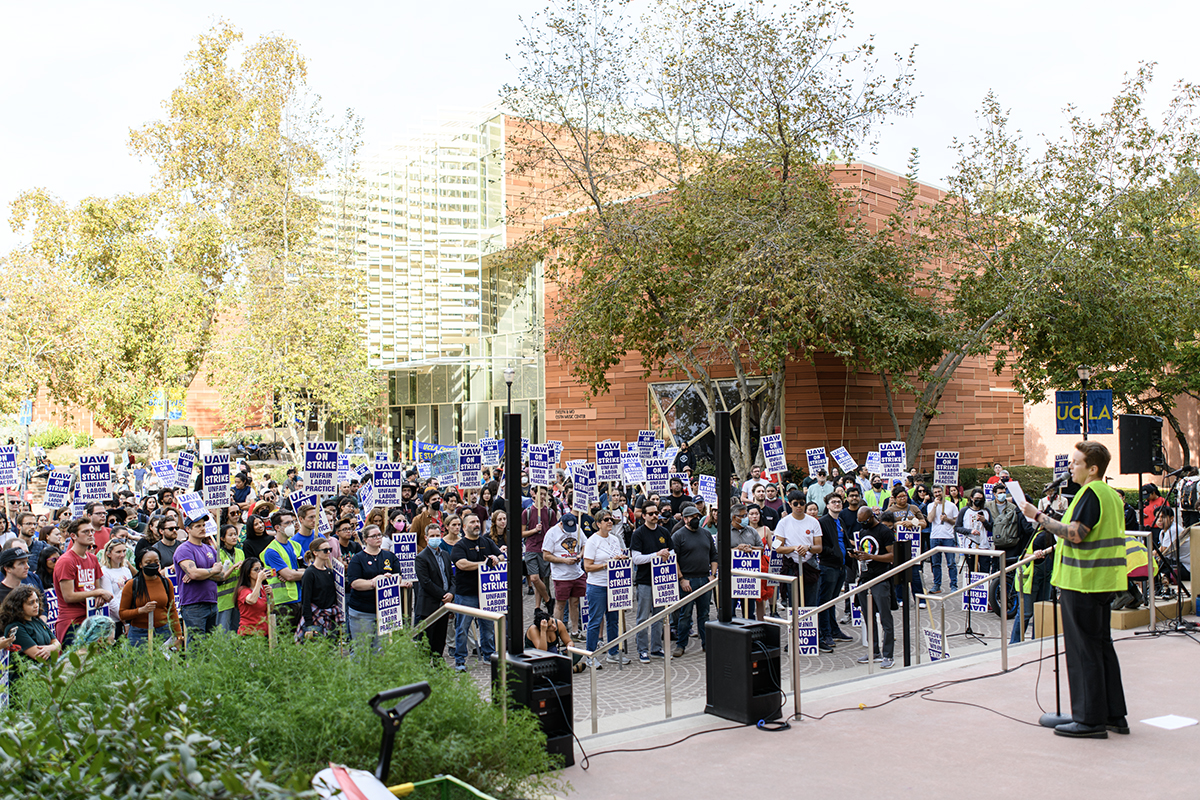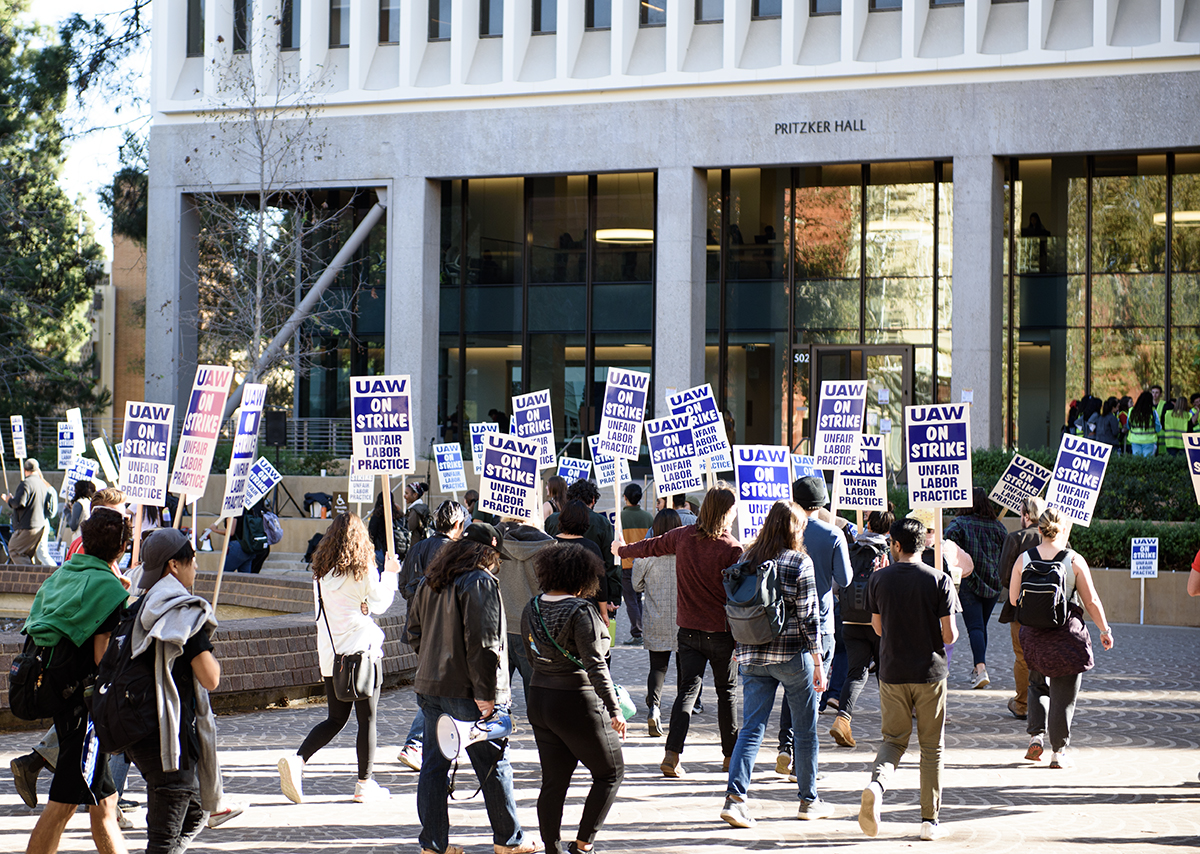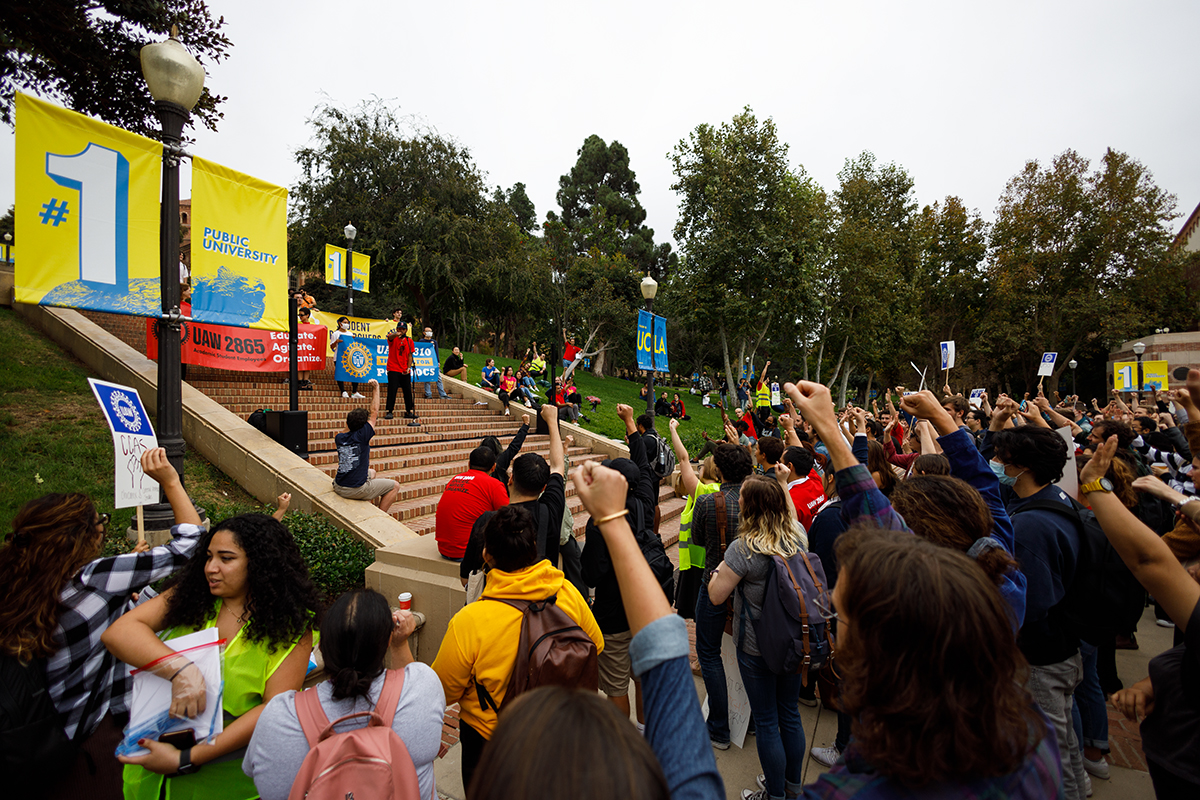Kitchen Committee provides free meals for UAW strike, continues operations
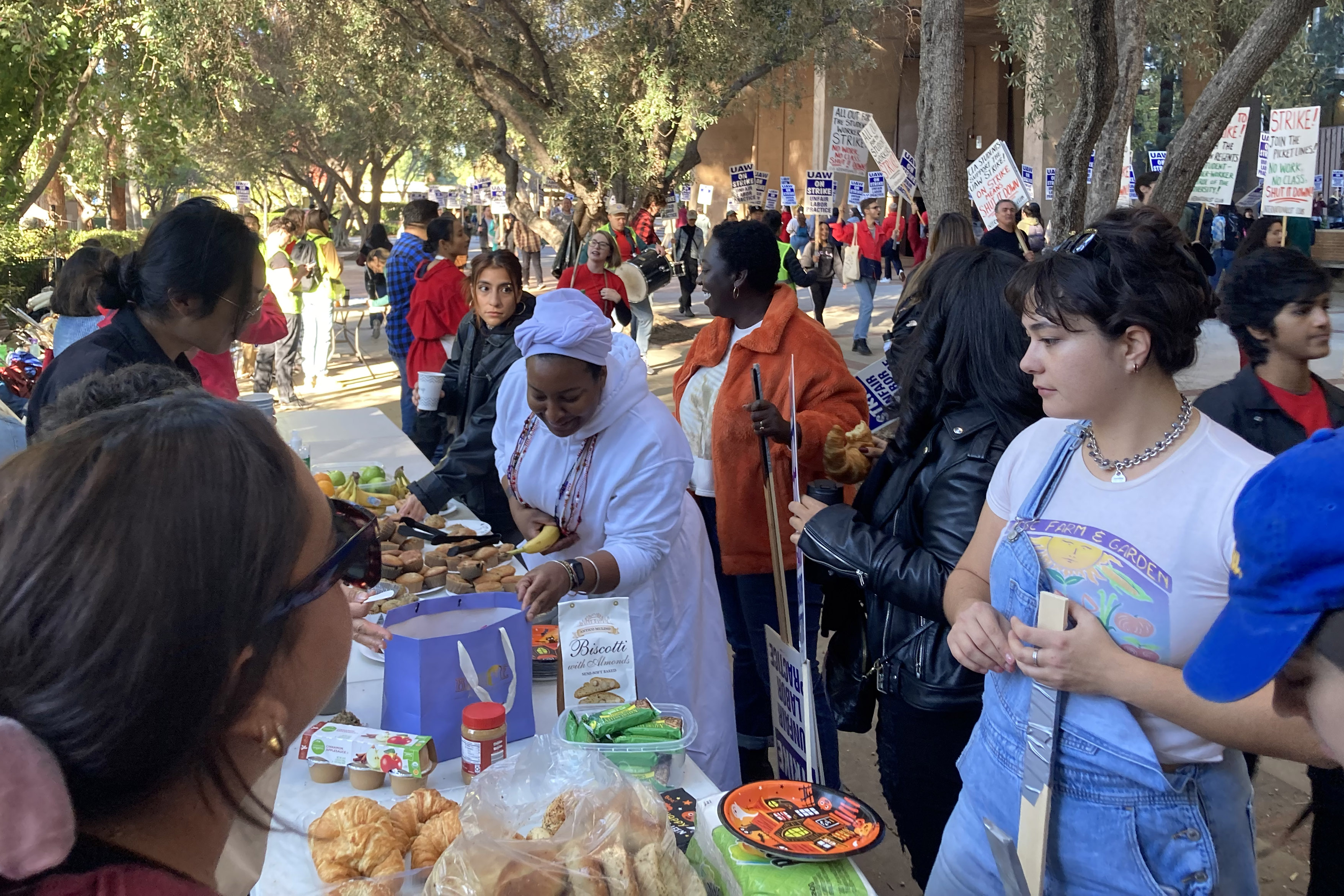
People pick up food from a table set up near Bunche Hall during the United Auto Workers strike. The Kitchen Committee, which was set up during the UAW union strike but remains open now, aims to create a close community among food-insecure graduate students. (Courtesy of Kitchen Committee)
By Alicia Carhee
May 21, 2023 10:23 p.m.
This post was updated May 31 at 5:20 p.m.
Rafik Wahbi’s favorite memory at UCLA is a simple one: Eating warm-in-your-belly chili on a crisp day, playing his Darbuka outside Bunche Hall and talking with other graduate students about the nerdy things graduate students talk about.
In the fall, multiple United Auto Workers unions representing academic workers across the UC system went on the largest academic strike in United States higher education history. The lack of meal planning at the beginning of the strike meant that faculty donated food from restaurants or brought homemade meals, and UAW staff had to help purchase groceries for the strikers, said Jacqueline Perez, unit chair of UAW Local 2865 at UCLA.
In response to the physically demanding hours on the picket lines, graduate students created the Kitchen Committee, a group that gave strikers, students and faculty free cooked meals – including its famous chili. Amber Chong, a second-year anthropology doctoral student and member of the Kitchen Committee, said that initially UAW leadership provided water bottles to help strikers sustain themselves.
“With the physical presence that was demanded, it became very apparent – even before the strike formally began – that nourishment was needed. And it also became very apparent that it would not be provided by UAW,” Chong said.
Although the strike ended Dec. 23 with new contract agreements, the Kitchen Committee remains active. The committee distributes prepared and packaged meals for free to students on nominated days, offering pickup on campus or delivery options to Westwood and neighboring areas, according to the committee’s Instagram.
Mikey Buse, a second-year history doctoral student, said the Kitchen Committee, with no funding from UAW, often relies on its community of supporters. They added that people help by cooking or bringing food to potlucks. Chong added that some supporters also donate money.
People have turned their home kitchens into spaces for the committee to cook and prepare meals, said Samyu Comandur, a second-year political science doctoral student. She added that the Kitchen Committee has helped her build bonds with other students.
“I’m really grateful because it means I get to see people I care about every week and cook with them,” she said.
Wahbi, a public health and community health science doctoral student, said he first heard about the Kitchen Committee from a friend while taking photos around campus to document the strike. Having experienced severe weight loss from food insecurity as well as academic and work-related stress, the Kitchen Committee became a community near and dear to him, Wahbi said. He added that he admired how fellow strikers took care of each other despite the tension between the workers, the bargaining team and the UC.
“It’s (the strike) is not just an endpoint,” he said. “It’s the process (of) what we’re doing along the way (that) is just as important – how we do it, how we connect with each other, how we take care of each other.”
UCLA spokesperson Ricardo Vasquez said in an emailed statement that the university is committed to supporting the student body in meeting basic needs, such as food and housing security. UCLA said it provides various resources such as the Graduate Student Resource Center, which provides complimentary meals, and the Community Programs Office, which offers an anonymous food pantry for students.
However, the university could do more to acknowledge and address food insecurity among its students, Wahbi said.
“This is not the university that I want to be a part of, and not the one that I would ever want to give down to the next generation,” he said. “I shouldn’t lose 30 pounds. Losing 10 pounds every year – is that how it works? Is that part of the deal?”
The Kitchen Committee continues to operate indefinitely, with its most recent meals being provided May 18.
Wahbi added that spaces such as the Kitchen Committee allowed him to eat with fellow students who understood his struggles. He said he admires how the committee has continued to take action to alleviate food insecurity since the strike’s end.
“I think the university can be a really isolating place. It’s huge and incredibly siloed,” Chong said. “People just jumped in, and everything from carpooling to doing grocery runs, … it meant a lot. And the kind of network that emerged is not something I had seen in any university space before.”



